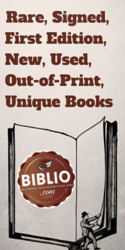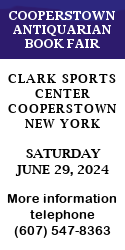Fighting Back in the Digital Age
The weather for the Cooperstown Antiquarian Book Fair was what it’s been for much of the summer in the Northeast—mostly cool and rainy days and nights with occasional intervals of sunshine. (At the moment, however, there’s still hope for an old-fashioned spell of August heat.) Even with unusual weather and an uncertain economy, it looked as if attendance was generally in line with years past, and though I have no real information on how sales went overall, some booksellers seemed quite pleased, others less so—but isn’t this nearly always the case at book fairs?
Despite the short notice, Paul Minet’s book signing went fairly well. A few people even made it a point to mention they made the trip to Cooperstown to meet Paul and get an autographed copy of “Late Booking”—and together with the book fair it made for a complete bookman’s holiday. The sales of the book exceeded expectations, but there was a planned surplus so now we can again offer copies to our readers (see the ad elsewhere in these pages) who live in other parts of the country.
One thing that tends to happen when book people get together is the usual exchange of trade gossip and a certain amount of show-and-tell. (And Paul, Sheila, Raquel and I did plenty of that). For some folks it might be interesting comparing downloaded texts and storage capacities of electronic readers, but in my opinion there’s nothing like the real thing. For example, the full run of the Spectator can be found on any number of websites, but how do you explain to someone raised and marinated in the digital age what it’s like to read an original folio half-sheet, looking much as it did when it came off the press at the Dolphin and most likely handled by Addison or Steele before they repaired to Will’s or Button’s coffee house to collect gossip and write material for the next day’s edition? If you have to explain this to someone, they probably wouldn’t understand.
In a letter to “Mr. Spectator”, from an original printing of number 443 (July 29, 1712) , “Camilla” complains of her treatment in England before moving to Italy where she found a more receptive, if not adoring, audience.
I take it extremely ill, that you do not reckon conspicuous Persons of your Nation are within your Cognizance, tho’ out of the Dominions of Great-Britain. I little thought in the green Years of my Life, that I should ever call it an Happiness to be out of dear England; but as I grew to Woman, I found my self less acceptable in Proportion to the Encrease of my Merit... I live here distinguished, as one whom Nature has been liberal to in a graceful Person, an exalted Mein, and Heavenly Voice... The Italians see a thousand Beauties I am sensible I have no Pretence to, and abundantly make up to me the Injustice I received in my own Country...
She dwells at some length on these matters because she had the misfortune to live at a time when Italian operas, especially those with pastoral themes, were often ridiculed by the English critics. The attacks usually appeared in periodicals such as the Spectator, but notwithstanding, Camilla concludes “I know, Sir, that you were always my Admirer, and therefore I am yours”. But just to make sure Spectator readers know, she adds “P.S. I am ten times better dress’d than ever I was in England.” So there.
The letters and essays are interesting but I find the advertisements more entertaining and revealing about life at the time. A representative sampling as follows:
Is continued to be Sold the remaining part of Twenty Hogsheads of neat French Brandy, full proof and of true flavour... at 8 s. a Gallon for any Quantity less than half a Hogshead: At the Black Lyon over-against Mercer’s-Chapel in Cheapside...
(or)
Whereas one William Cowpland has, by several Advertisements, pretended himself to be the only Person that knows how to make the English Barreli’d (sic) White Soap: To prevent the Publick therefore from being imposed on by such groundless Pretences, this is to give Notice that Thomas Vincent, at the Three Doves in Marrowbone-street, at the Upper-End of St. James’ Haymarket, made that Soap for several Years before ever the said Cowpland pretended to any Knowledge of that Trade...
It goes on at some length, and in our own country where WeightWatchers, Jenny Craig, Lean Cuisine and the like are all part of one of our major growth industries, the next ad seems a little strange:
An assured Cure for Leanness; which proceeds from a Cause that few know, but easily removed by an unparallei’d Specifick Tincture, which fortifies the Stomach, purifies the Blood, takes off Fretfulness in the Mind, occasions Rest and easy Sleep, and as Certainly disposes and causes the Body to thrive and become plump and fleshy...
Take that Jenny Craig, otherwise no comment—except that maybe a lot of people were hungry (?) and couldn’t afford a loaf of bread, much less the Specifick Tincture.
Part of the show-and-tell included poking through some of our own early Oneida Community imprints from Putney, Vermont and the Oneida Reserve in New York (see front cover); and lately I’ve been reading some of the articles in a bound copy of the first volume of Philobiblion (December 1861 – November 1862), the “Monthly Bibliographical Journal Containing Critical Notices of, and Extracts from Rare, Curious, and Valuable Old Books.” The latter a gift from the Minets.
The striking thing about magazines that limit their coverage to strictly bibliophilic matters is that they are all relatively short-lived—why this is I do not know, but I suspect it might have something to do with lack of connectedness to the real world most people live in. Escapism is wonderful in short doses, but we can’t get away from reality indefinitely. In the May 1862 number (one month after the Battle of Shiloh and about a month before the 1st Battle of Bull Run) there’s a brief notice of one Captain George Gordon de Luna Byron, reputed son of Lord Byron, who was serving in the U.S. Army—otherwise there’s barely a clue that a civil war was going on that was making a lot of people unhappy or dead.
Had anyone contributed a piece to Philobiblion connecting books to the burning issues of the time, some irate reader surely would have complained “...the subject has been done to death in the press and moreover has no place in a bibliophilic publication”. Harper’s and the Atlantic (Monthly) both of which predate Philobiblion and have always included a certain amount of politics and general culture in their bookish mix, still survive.
Meanwhile, back in the digital world, we are in the middle of a partial redesign of our own website in order to be able to make additions and changes on a continual basis. The Book Fair and Book Auction calendars will be updated and revised daily or hourly, if needed, and “Noteworthy” will become “Book News & Notes” (or similar) and be added to more frequently.
Also, “Booksellers’ Gulch” and “Maricela’s Book Club” will be featured more prominently. The former gives readers direct access to books catalogued and offered for sale on the websites of participating booksellers and anyone interested in setting up a “rent-free bookshop” along Booksellers’ Gulch is invited to ask for particulars.
The book club link invites readers to post book selections and details of their next meeting, comment on recently read books, or find out what other clubs are doing. One thing we’ve learned is that a lot of book clubs ignore recent best sellers in favor of older backlist titles or out-of-print books that are readily available in the antiquarian book trade.
We’re presently aware of two antiquarian bookshops that offer their premises to book clubs for their meetings, a good idea borrowed from some of the larger chain bookstores that has helped to increase both foot traffic and sales. Wasn’t it Picasso who said something like “good artists borrow, great artists steal”? Combine the concept with a small coffee bar, as some booksellers have done, and it’s not such a stretch to imagine a more intimate 21st century version of Will’s or Button’s coffee house, two of the Penny Universities of their day.

























